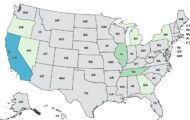The consumer groups Environmental Defense Fund, Natural Resources Defense Council, and others sent a letter to FDA Commissioner Gottlieb this week, objecting to the FDA’s denial of a petition to remove perchlorate from food packaging. The denial was issued on May 4, 2017. Those groups claim that the FDA ignored evidenced that shows the compound disrupts brain development in infants and children. The FDA was sued by those groups to force them to act on the petition in April of 2016.

Perchlorate is used in herbicides, explosives, and rocket fuel. Those groups say that the FDA’s own data shows that the chemical migrates from packaging into food. Perchlorate is added to packaging to reduce the buildup of static.
The letter states that “The serious flaws in the agency’s legal and scientific approach to perchlorate are numerous. The agency’s decision and its underlying analysis grossly underestimated the extent to which perchlorate migrates from packaging and food handling equipment into dry food. In measuring this migration, FDA relied on a single study using a test designed for small packaging that was conducted by a company with a vested interest in the outcome. This migration test bears little relevance to the actual conditions of use of the perchlorate in bulk packaging allowed by FDA. It was not designed to assess the abrasive and compressive forces driving the migration of perchlorate into food from this use. It also was not relevant to the contribution of perchlorate into food from food handling equipment. Despite these serious shortcomings, the company’s test still showed that perchlorate migrates into food.”
The FDA’s own data showed that perchlorate in dry food plastic packaging “likely contributed to the high, even shocking, levels of perchlorate found in dry baby food cereals by FDA in its Total Diet Study samples,” according to the letter. The FDA approved the use of perchlorate in 2005. Before that time, perchlorate concentrations in those baby food cereals were relatively low. Now, high concentrations of perchlorate in those products “suggest that they may result from use of the perchlorate-laden plastics.”
The law states that additives must be “reasonably certain to cause no harm under the intended conditions of use.” But samples collected from 2008 to 2012 shows that mean cumulative exposures to perchlorate increased 36% for infants 6-11 months old, and 24% for toddlers two years old.
The letter also states that the decision shows a “disturbing failure to account for the accumulating body of evidence that perchlorate poses a risk of irreversible harm to the fetal and infant brain.” Almost all Americans have some perchlorate in their bodies.
The letter lays out three objections to the denial, including that the FDA relied on a flawed interpretation of the definition of a food additive; that FDA first accepted all petitioner requests as properly filed, then later determined that they were not eligible; and that FDA failed to make a timely decision on the petition.
The petitioners are asking for a formal evidentiary public hearing on this issue. They have filed a formal request. Other groups included in the petition are Clean Water Action, Center for Science in the Public Interest, Breast Cancer Prevention Partners, Center for Environmental Health, Center for Food Safety, Environmental Working Group, Natural Resources Defense Council, and Improving Kids’ Environment.




